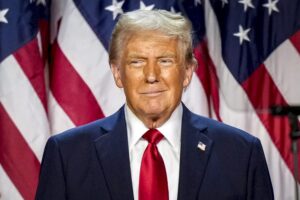
Washington, D.C. – February 18, 2025
Former U.S. President Donald Trump has announced a new trade policy aimed at enforcing reciprocal tariffs, a move he says is necessary to address long-standing trade imbalances between the United States and its trading partners.
In a policy statement released on February 13, 2025, Trump declared that the U.S. would impose tariffs equivalent to those levied by foreign nations on American goods. He emphasized that this approach is designed to promote fairness in international trade.
“On trade, I have decided for purposes of fairness that I will charge a reciprocal tariff—meaning whatever countries charge the United States of America, we will charge them no more, no less,” Trump stated during the announcement.
The policy targets key trade disparities, including the European Union’s 10% tariff on imported cars, compared to the 2.5% tariff the U.S. places on European car imports. Additionally, the plan includes new tariff measures, such as a 25% tariff on imports from Canada and Mexico and a 10% tariff on goods from China. The administration has linked these measures to broader concerns, including illegal immigration and drug trafficking.
The announcement has drawn swift reactions from international trade partners. China has called for a debate at the World Trade Organization (WTO) regarding what it describes as “trade turbulence” resulting from the new U.S. tariffs. Beijing has also imposed its own retaliatory tariffs and filed a formal dispute at the WTO.
The Trump administration has indicated that further reviews of international tariffs are underway, with implementation of reciprocal tariffs expected as early as April 2025. The policy shift is expected to reshape global trade dynamics, with potential economic and diplomatic consequences for U.S. relations with key allies and trading partners.




